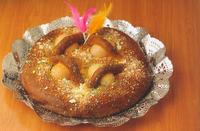As Luisa and Marika have already shown their typical traditions during Easter. I am going to show you some of our traditions here in the Valencian Community.
 First, we have the "mona de Pascua". It is similar to your "Titola" in Trieste and the "Tsoureki" in Corinth, but our "mona" is usually round, with one or two boiled eggs. It has also some dried fruit and anised tiny colour balls to decorate. Another typical decoration is a chick figure or a feather on it. They are typically made at home, for example, my mum always makes them for all the family in several shapes, for example, as frogs. The "monas" can be filled with chocolate, they are delicious!!!
First, we have the "mona de Pascua". It is similar to your "Titola" in Trieste and the "Tsoureki" in Corinth, but our "mona" is usually round, with one or two boiled eggs. It has also some dried fruit and anised tiny colour balls to decorate. Another typical decoration is a chick figure or a feather on it. They are typically made at home, for example, my mum always makes them for all the family in several shapes, for example, as frogs. The "monas" can be filled with chocolate, they are delicious!!!Another typical food is the "farinosa". It is made with the same dough but it is filled with "confitura de cabello de ángel", which is a sort of pumpkin jam. They are rolled and without eggs.
 And finally, we have also the typical chocolate eggs, or the chocolate figures: hens, rabbits... but also other fashioned figures. This year, I suppose that the most sold chocolate "monas" will be Hello Kittys and Bob Esponjas.
And finally, we have also the typical chocolate eggs, or the chocolate figures: hens, rabbits... but also other fashioned figures. This year, I suppose that the most sold chocolate "monas" will be Hello Kittys and Bob Esponjas.The tradition here is that the godfather or the godmother gives their grandson or granddaughter the "mona" to be eaten during the Easter Sunday with the family or friends. As Easter usually at the beginning of the spring, everybody goes to eat the "mona" to the country, and flying a kite is also a typical tradition.
It is thought that the word "mona" comes from the Arabic word "munna" which means "gift or present". And I have discovered that the eggs and the chicks represent the renewal and the rebirth, the resurrection of Jesus Christ.
I hope you will like all this information about Easter in our region!
Happy Easter!


Thank you very much for all your traditions you shared with us!!!
ReplyDeleteFinally tsoureki-titola-mona is the same!!!
Farinosa looks also delicious!!!
Ok, after Easter we have to upload some diets...
Happy Easter to all of you!!!
Marika
Jajaja mmmmsss... It's delicious! I hope that I could taste tsoureki or titola!
ReplyDeleteKisses from Spain! Happy Easter! ^^
What does jajaja mean in Spanish, Anma? Because in Polish means eggs. Sometimes when you are surprised you can say and use the following expression: ALE JAJA! which is a little similar to English: How weird!
ReplyDeleteI would like to ask you, Veronica the tradtition lf flying a kite, is it only for kids or for everybody? When do you fly a kite? You need of course windy weather, don't you?
Greetings from sunny Rybnik in Silesia.